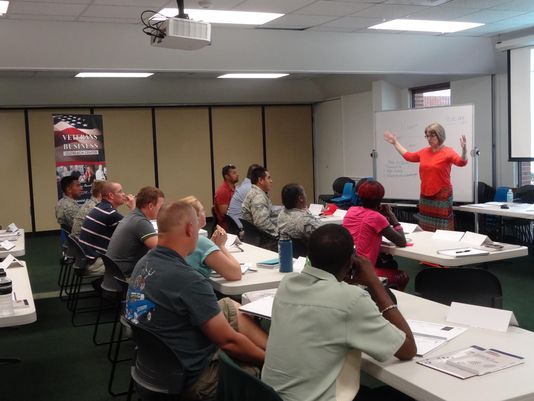By Alan H. Feiler
Soundoff! Laurel, Md.
Rich Moulton believes he has a gem of an idea.
A government contractor who retired from the Air Force last year after two decades in uniform, Moulton wants to create a luxury jewelry brand.
Moulton came up with the idea after his wife, Zahide, expressed frustration about seeing the same mass-produced jewelry virtually everywhere.
“For a woman with refined, exotic tastes, this would be jewelry from around the world and it would be unique handmade silver and gold jewelry,” said Moulton, a combat veteran and father of two who lives in Odenton.
“I stayed in the military for 20 years because I didn’t know what I wanted to be when I grew up. I’m happy with my current job, but I’d like more freedom to carve my own path. I want to eventually be my own boss with my own entity and resources.”
Moulton and 13 other active-duty and retired service members, mostly in their 20s and 30s, attended the Operation Boots to Business workshops offered Aug. 26-27 at the Fleet and Family Support Center.
Started in 2013, Boots to Business provides education, training and resources on entrepreneurship to transitioning service members, retirees and their spouses at military installations around the world. The program is administered through the Small Business Administration, the Department of Defense and the Department of Veterans Affairs as part of DoD’s Transition Assistance Program.
The curriculum includes steps on assessing the viability of business concepts, the foundational knowledge required for a business plan, and information on resources for start-up capital and technical assistance.
“The people in the military are sacrificing a lot, and we owe it to them to do our best for them,” said Mark Williams, veterans business development officer for the SBA’s Baltimore office.
Williams is the coordinator of the Boots to Business workshops held six to seven times annually at Fort Meade. The free workshops are also presented regularly at Aberdeen Proving Ground, Fort Detrick, Naval Air Station Patuxent River and the U.S. Naval Academy.
A retired Marine and former Defense Information School instructor, Williams said transitioning service members often are unaware of all the resources available to them for starting their own businesses. Such information is crucial in an economy in which the jobs market is shrinking, he said.
“The two main things they need to know are what it takes to start a business and how to find the resources,” Williams said. “Being a veteran doesn’t give you much weight when you borrow money. It has to be a good business decision or a bank won’t lend you money.
“The lenders try to give leeway to veterans, but it can’t be a bad deal.”
Among the topics at the workshops were an introduction to the entrepreneurial experience; understanding how to conduct market research and competitive strategy/analysis; an overview of the legal considerations affecting veteran-owned businesses; how to finance a start-up venture; locating resources to support a successful launch and sustainable growth; the pros and cons of franchising; and creating a viable business plan.
Williams noted that the SBC, in conjunction with the Whitman School of Management at Syracuse University, N.Y., also offers a free, eight-week online business-plan development course as part of Boots to Business.
“We’re just letting people know all the options out there,” Williams said, “I look at it as a reality check. All you can do is give them an [introduction]. They see there are people out there that will help you for free. You just have to do your research”
In addition to Williams, guest speakers and instructors at last week’s workshops were David Buck of The Entrepreneur’s Source, Bonnie Barresi of the Maryland Capital Enterprises Women’s Business Center, and Gabe Omaru of the Corridor Region Small Business Development Center.
Omaru said he enjoys talking to service members and veterans about entrepreneurship.
“It’s very rewarding,” he said. “A lot of people take early retirement and want to run a business for the next 20 or 30 years. Finding a job after the military is very difficult. But if you own your own business and are passionate about it, it can help you for a long time.
“You have to be willing to work 12 hours a day and put yourself through a lot of stress. We try to inform and educate people, so they can prepare and plan.”
Navy Petty Officer 1st Class Reauthtie Yun, who works at the National Security Agency, said he learned a lot from the workshops. After leaving the Navy next year, Yun hopes to start a financial consulting business for middle-income families.
“I want to be able to do whatever I want, whenever I want, without having to ask for time off,” Yun said. “I don’t want to be told when to work and at what salary. I want to own my own business and have my freedom. That’s the American dream.
“This [workshop] has helped me figure out who I want to target and how a business gets started.”
Moulton agreed.
“They’ve helped us understand the process and all the resources available,” he said. “A lot of people have ideas; it all comes down to execution. This has been very helpful to me.”
Editor’s note: For more information about Boots to Business, call 410-244-3329 or email mark.williams@sba.gov. To participate in the program, service members can contact their transitioning office or the Small Business Administration.
___














































































































































































































































































































































































